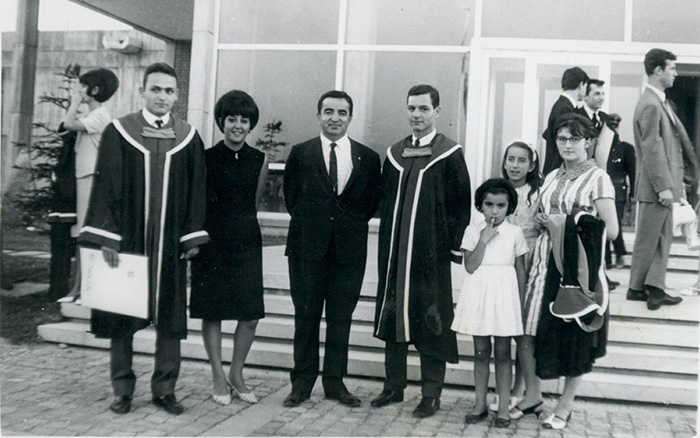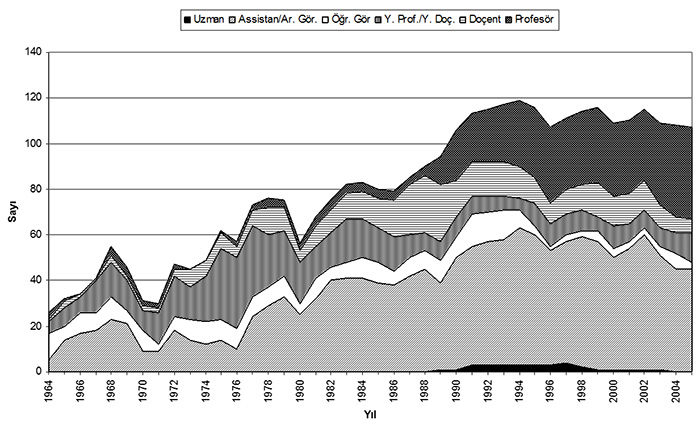
METU Department of Electrical and Electronics Engineering (EEMB) was established in 1958, only two years after the foundation of METU, with limited opportunities and gave its first graduates in 1962. In the early years, like the other departments, the Department of Electrical Engineering, which was the name of the department at that time, was situated at the outbreak and surroundings of the "new" Turkish Grand National Assembly building which was not yet in use. The Department was at the size of a 20 square meter room in 1959. In the following year, a bigger room and a laboratory hut… In the next year, a research laboratory extension with the beginning of graduate program… (Today, the nearest roof to the wall seen at the right behind the TBMM wall belongs to this extension while approaching the General Staff Crossroad from Dikmen.) In 1964, when the Department of Electrical Engineering was moved to A, B, and C blocks in METU Campus, the first three classes were already graduated.

During the foundation years, the faculty members were also very limited and unstable. Apart from Mustafa Parlar, the founding chairperson of the department, there was not anyone else who had an academic milestone or who had chosen to be an academician. Most of the courses were carried out by government agencies and engineers with additional duties who were trained abroad in the name of the Armed Forces. Foreign experts provided by the UNESCO channel, other than exceptions like Kenneth K. Clarke, generally did not have academic formation and accumulation. It can be said that in the early years when the staff was unstable, even the training programs were shaped according to the staff at hand rather than the program needs. However, even under these conditions, these deficiencies were eliminated by the strong motivation, rich library and laboratory facilities led by Mustafa Parlar. At this point, the contribution of English education is significant. Students were influenced by the high motivation they saw in the faculty members and improved their ability to learn on their own by using the library facilities and using their English language skills despite being weak. English served as a window opening to the world from Anatolian steppe. A great opportunity has been provided for curious and talented students. In the meantime, it should also be pointed out that students who have chosen this department in those years, when Electrical Engineering is not yet among the "most popular" branches, were curious and enthusiastic.

Mustafa Parlar (one of the founding professors of department) with the graduates of the department, 1965
The limitations of the faculty staff in the foundation years have been overcome with conscious and long-term planning, instead of daily solutions. Investments were made by considering young people and perpetual staffing was maintained by educating own faculty staff. In 1960-62, the recruitment of a considerable number of young engineers as faculty members along with the encouragement for doctorate programs, and the inculcation of the graduates with mechanisms such as "student assistantship" for academic motivation were the example positive efforts in this regard. With the start of the Ph.D. program in 1966 and the return of the young graduates completing their doctorate education abroad, a self-growing and self-renewing faculty staff is constituted. The effect of these stages is evident in Figure 1, which shows the development of the teaching staff since the beginning.

Annual numbers of faculty members
Apart from the establishment and development of the department is concerned, Mustafa Parlar also had a great influence and contribution in creation of research policies. Implementation studies performed in the graduate programs have encouraged developing useful designs and prototypes for the country. Some of the topics have been developed and passed on through a series of theses. For example, the workings on the requirements of the Turkish Electricity Authority contained within Etibank in the first years is noteworthy.[1]. For example, the power line carrier developed through a number of postgraduate studies for this institution, is the first PLC developed in Turkey and even the first PLC functioning with transistor in the world. Again, the design of the original metrology trajectory, developed for the same institution and in the same way, paved the way for the establishment and development of the transformer industry in the country as well as meeting the needs of the institution and ensuring the formation of a conglomerate of the national electromechanical industry.
The launching of doctoral programs in 1966 played an important role in the formation of the research atmosphere as well as the training of teaching staff. The inadequacy and variability in the teaching staff of the first years also manifested itself in the execution of doctoral programs. It can be stated that the first Ph.D. students had to manage themselves. However, Mustafa Parlar prepared the doctoral studies as departmental memorandums and submitted it to the US for opinion to prove that the work was done at world standards. The publication of the results of all doctoral studies in internationally respected journals such as IEE and IEEE was a prerequisite for obtaining doctoral degrees. It can be concluded that METU Department of Electrical and Electronics Engineering has trained its own staff. Thus, in the1980s, the Department raised its own academic staff and reached the world standards with the academic quality of the courses given, theses and researches.
The faculty members who have taken doctorate degrees abroad have also made important contributions to the education and research activities of the Department by providing necessary information and have established laboratories that can produce high technology in almost every branch of electrical and electronic engineering. All the costs of these laboratories are met by practical projects carried out in the Department.
Until the mid-1970s, our graduates were employed in public institutions such as PTT, TRT, TEK. Beginning from those years, the development of the electrical and electronics industry in Turkey has led to the emergence of organizations such as Teknim, Aselsan, Havelsan and thus the original design requirement. In addition, power transformers, power supplies, telecommunication devices, medical electronic devices and cable factories were established in the private sector. The driving force of these institutions is the graduates of METU Electrical and Electronics Engineering Department. The tradition of research and development carried by our graduates to these organizations underlain the success of the original design and research based production companies. Some of our graduates have contributed to the development by undertaking key tasks in large organizations, while others have achieved success with the companies they have established both domestically and abroad. (Figure 2).

Focusing on increasing its inward-looking academic accumulation until the 1980s, the Department of Electrical and Electronics Engineering also achieved industrial relations with the emergence of ASELSAN established in those years. This important project was directly contributed through the appointment of three faculty members. UASELSAN, the pioneer of the national defense industry, gave great importance to industrial R & D studies and faculty members of ODTÜ Electrical and Electronics Engineering Department worked as a consultant and researcher in ASELSAN projects. With this cooperation, originally designed numerous projects with high technology have been successfully completed. Thanks to these associations, the university's lectures, theses, laboratories and academic R & D work have been supported and academic and industrial R & D studies in the department have been able to compete with the world. These relations have greatly increased the productivity of both sides. Today, the ASELSAN staff consists mainly of METU EEE graduates.
METU Electrical and Electronic Engineering Department has been in close cooperation with the Scientific and Technical Research Council of Turkey (TÜBİTAK) since the foundation. The first seeds of today's Marmara Research Center were laid in this Department in the early 1970s. Afterwards, TUBITAK Institute of Information Technologies - BILTEN (TUBITAK Ankara Electronic Research and Development Institute - TAEAGE - the elder name of it) which was founded in the first half of 1980s, has been carried out for many years in departmental buildings with the managerial and scientific contributions of the Department members. This cooperation, which has provided important contributions to the potential of the Department's research, is still ongoing despite BILTEN's departure from the Department.
Önder Yüksel
